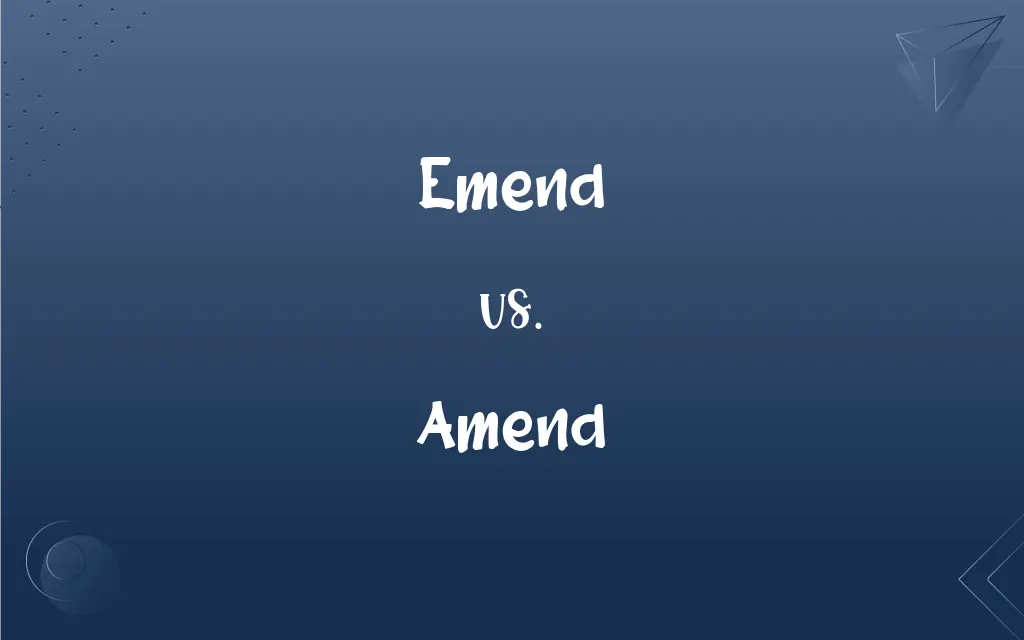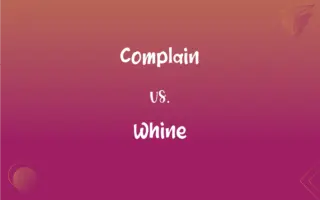Emend vs. Amend: What's the Difference?
Edited by Harlon Moss || By Janet White || Updated on November 13, 2023
Emend refers to making corrections or improvements to a text, focusing on accuracy and removal of errors; amend involves making changes or improvements to a broader range of things, often for betterment or rectification.

Key Differences
Emend is primarily used in the context of editing texts, with a focus on correcting errors or inaccuracies. Amend is broader, encompassing changes to documents, laws, plans, or personal behaviors, often for improvement or rectification.
Emendations are typically minor but crucial changes for accuracy, like fixing typographical errors or misquotations in a manuscript. Amendments can be substantial, involving significant alterations to the content or structure of a document, law, or policy.
Emend is commonly used in scholarly, literary, or publishing contexts where precision in text is paramount. Amend is used in legal, legislative, and personal contexts, indicating changes for legal adaptation, moral improvement, or adaptability.
The intent of emending is to correct and clarify, ensuring fidelity to the original meaning or intent of the text. Amending often aims at updating, improving, or rectifying to adapt to new information, conditions, or perspectives.
Emendations generally have a limited scope, affecting the specific text being edited. Amendments can have broader implications, affecting legal interpretations, societal norms, or individual behaviors.
ADVERTISEMENT
Comparison Chart
Primary Context
Textual corrections and improvements
Broad changes to documents, laws, behavior
Nature of Changes
Minor, focused on accuracy and errors
Can be substantial, altering content or structure
Typical Usage
Scholarly, literary, publishing contexts
Legal, legislative, personal contexts
Intent and Purpose
Correcting, ensuring fidelity to original
Updating, improving, rectifying
Impact and Scope
Limited to specific text
Broader implications and effects
ADVERTISEMENT
Emend and Amend Definitions
Emend
To make corrections or revisions to a text for accuracy.
The editor emended the manuscript to correct the factual errors.
Amend
To alter or modify for the better.
She amended her plans to accommodate the new information.
Emend
To revise a written work for the sake of precision.
The historian emended the document to reflect the accurate dates.
Amend
To make changes to a document or law for improvement or rectification.
The constitution was amended to include new rights.
Emend
To improve a text by removing errors or clarifying content.
She emended her article to enhance its clarity.
Amend
To revise or reform personal behavior or actions.
He amended his habits for a healthier lifestyle.
Emend
To alter slightly in order to correct or improve.
He emended the translation to better capture the author's intent.
Amend
To correct faults or improve a situation.
The company amended its policies to increase employee satisfaction.
Emend
To rectify mistakes in a piece of writing.
The proofreader emended several typos in the report.
Amend
To update or adapt to new conditions or information.
The scientist amended her theory in light of the new data.
Emend
To improve by critical editing
Emend a faulty text.
Amend
To change for the better; improve
"The confinement appeared to have had very little effect in amending his conduct" (Horatio Alger).
Emend
(transitive) To correct and revise (text or a document).
Amend
To alter the wording of (a legal document, for example) so as to make more suitable or acceptable.
Emend
To purge of faults; to make better; to correct; esp., to make corrections in (a literary work); to alter for the better by textual criticism, generally verbal.
Amend
To enrich (soil), especially by mixing in organic matter or sand.
Emend
Make improvements or corrections to;
The text was emended in the second edition
FAQs
Can amend be used for personal changes?
Yes, like amending behavior or habits.
Is emending limited to written texts?
Yes, it typically refers to correcting written material.
Do amendments always involve laws?
Not always; they can refer to any significant changes or updates.
Can emendations affect the meaning of a text?
They aim to clarify rather than change meaning.
Are amendments always positive?
They're intended for improvement, but perceptions of positivity can vary.
Is emend relevant in digital content?
Yes, especially in editing online articles or e-books.
Is emend used in legal documents?
Rarely, it's more common in scholarly or literary texts.
Can a law be emended?
Typically, laws are amended, not emended.
Can organizations amend their policies?
Yes, to reflect changes in goals or external conditions.
Can amending be a lengthy process?
Yes, especially in legislative or organizational contexts.
How often is emend used in everyday language?
It's more specialized, mostly used in academic or literary contexts.
Is there a limit to how much one can emend?
The goal is accuracy, so changes are as extensive as necessary for correctness.
Does emending involve extensive rewriting?
No, it usually involves making precise, minor corrections.
Can amendments be reversed?
Yes, through further amendments or legislative processes.
Can personal beliefs be amended?
Yes, through processes of learning and understanding.
Is emend a common term in editing?
Yes, especially in formal or scholarly editing.
Are amendments subject to approval processes?
In legal or organizational contexts, usually yes.
Can emend be used for artistic works?
It's less common, usually reserved for textual works.
Does amending imply a fault or mistake?
Not necessarily, it can be for adaptation to new situations.
Does emending require expertise?
Often, especially in specialized fields like literature or academia.
About Author
Written by
Janet WhiteJanet White has been an esteemed writer and blogger for Difference Wiki. Holding a Master's degree in Science and Medical Journalism from the prestigious Boston University, she has consistently demonstrated her expertise and passion for her field. When she's not immersed in her work, Janet relishes her time exercising, delving into a good book, and cherishing moments with friends and family.
Edited by
Harlon MossHarlon is a seasoned quality moderator and accomplished content writer for Difference Wiki. An alumnus of the prestigious University of California, he earned his degree in Computer Science. Leveraging his academic background, Harlon brings a meticulous and informed perspective to his work, ensuring content accuracy and excellence.































































